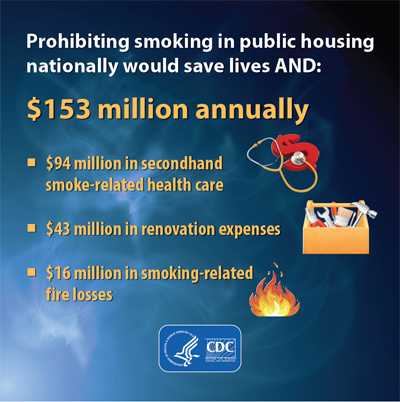Almost $500 million could be saved annually by making subsidized housing smoke-free
First state level data shows great variation in cost savings
This website is archived for historical purposes and is no longer being maintained or updated.
Press Release
Embargoed until: Thursday, October 2, 2014, 12:00 Noon, ET
Contact: Media Relations
(404) 639-3286

Prohibiting smoking in public housing nationally would save lives AND $153 million annually.
Entire Infographic
Prohibiting smoking in all government subsidized housing in the United States, including public housing, would save an estimated $497 million per year in health care and housing-related costs, according to a CDC study published in Preventing Chronic Disease.
The total cost saved comprises of about $310 million in secondhand smoke-related health care, $134 million in renovation expenses, and $53 million in smoking-attributable fire losses. The analysis found that prohibiting smoking in public housing either owned or operated by a government housing authority would yield cost savings of $153 million annually.
The study is the first of its kind to estimate the annual cost savings of making subsidized housing smoke-free in each state. Those cost savings range from $580,000 in Wyoming to $125 million in New York. The range of cost savings for states from prohibiting smoking in public housing alone range from $130,000 in Wyoming to $58 million in New York.
Nearly 80 million Americans live in multi-unit housing. Of these, nearly 7 million U.S. multi-unit housing residents live in government subsidized housing, including approximately 2 million in public housing. Multi-unit housing residents are susceptible to secondhand smoke exposure because studies have shown that secondhand smoke gets through ventilation systems and windows and spreads into units where no smoking occurs. The potential for secondhand smoke exposure in public or subsidized housing is especially concerning because a large number of the residents in these units are particularly vulnerable to the impact of secondhand smoke, including children, the elderly, and the disabled.
“Already, over 500 public housing agencies have adopted some form of a smoke free policy, protecting approximately 200,000 families,” said Matthew Ammon, Acting Director of the Department of Housing and Urban Development’s (HUD) Office of Lead Hazard Control and Healthy Homes. “This study reinforces HUD’s work that promotes health and reduces costs by encouraging public housing agencies, multi-family housing owners and agents, as well as residents, to adopt and implement smoke-free housing policies.”
HUD is a member of the National Prevention Council and is committed to advancing the National Prevention Strategy’s priority of Tobacco-Free Living. Since January 2012, the number of smoke free public housing agencies has more than doubled, and HUD continues to educate housing operators and residents about the health and economic benefits of prohibiting smoking, and encouraging smoke-free policies. HUD will also continue to provide practical guidance on the adoption and implementation of smoke-free policies. Providing resources and information on smoking cessation and preventing the initiation of smoking will help increase the number of subsidized housing residents protected by these policies.
The Surgeon General has concluded that there is no safe level of exposure to secondhand smoke and that only 100 percent smoke-free policies fully protect people from involuntary exposure. Secondhand smoke kills more than 40,000 Americans each year and causes health problems in adults such as cancer and heart disease. Children exposed to secondhand smoke have more frequent and intense asthma attacks, more respiratory infections and higher risk of sudden infant death syndrome.
For more information on secondhand smoke, visit http://www.cdc.gov/tobacco/data_statistics/by_topic/secondhand_smoke.
For smoke-free housing toolkits and other information for owners and managers of federally assisted public and multi-family housing, visit http://portal.hud.gov/hudportal/HUD?src=/smokefreetoolkits1.
- Page last reviewed: September 9, 2014 (archived document)
- Content source:
Error processing SSI file


 ShareCompartir
ShareCompartir